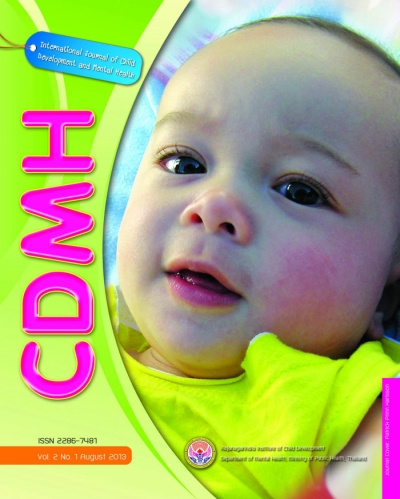Effectiveness of the Picture Exchange Communication System (PECS) in school aged children and adolescents with autism in Child Psychiatric Ward Maharaj Nakorn Chiang Mai Hospital
Main Article Content
Abstract
There is a growing number of children with autism at present. It is believed to promote
developments of children but autistic children may exhibit some limitations for treatment. Language development is another difficulty for them to acquire for verbal communication with other people. The purpose of this study was conducted to study the outcome of the Picture Exchange Communication System (PECS) in school-aged children and adolescents with autism in Child Psychiatric Ward of Maharaj Nakorn Chiang Mai Hospital.
This study is a single-case research. Participants ought to diagnosed as autistic according
to the Diagnostic and Statistical Manual disorders 4th-edition Text Revision (DSM-IV-TR) were six case studies at the age of 6-19 and both genders were recruited. The procedures were 1) educate the nursing staffs 2) Assigned the training sessions for 3 months 3) Followed up the training session and evaluated the progress each day for the entire 3
months. The results revealed that after used PECS for 3 months, five case studies had been improved communication. There were no increases of speech, but improvements in language test scores Before attending the Picture Exchange Communication Program, six people of the sampling group showed the average communicative ability at 3.83. Their scores averagely rose to 6.83 after the program was provided. These results indicated the positive trend of using the PECS in school aged children and adolescences with autism. This provides an opportunity for helping autistic people without communication.
Article Details
![]()
Creative Commons License
This work is licensed under a Creative Commons Attribution-NonCommercial-No Derivatives 4.0 International (CC BY-NC-ND 4.0)
The authors retain copyright and permit the journal the copyright of first publication
Articles, once having passed the review process and accepted for publication in the CDMH Journal, are copyrighted under the CDMH Journal, Department of Mental Health, Ministry of Public Health. Please be aware distribution of CDMH Journal content for commercial purposes without permission is expressly prohibited. However, distribution with intent to educate, advocate, or spread awareness within the general public and research communities is permitted and encouraged with the understanding that the CDMH Journal Editorial Board do not hold jurisdiction or liability for any accompanying comments, text, or information from third parties, either in favor for or against the original article’s assertions, conclusions, methodology, or content.


